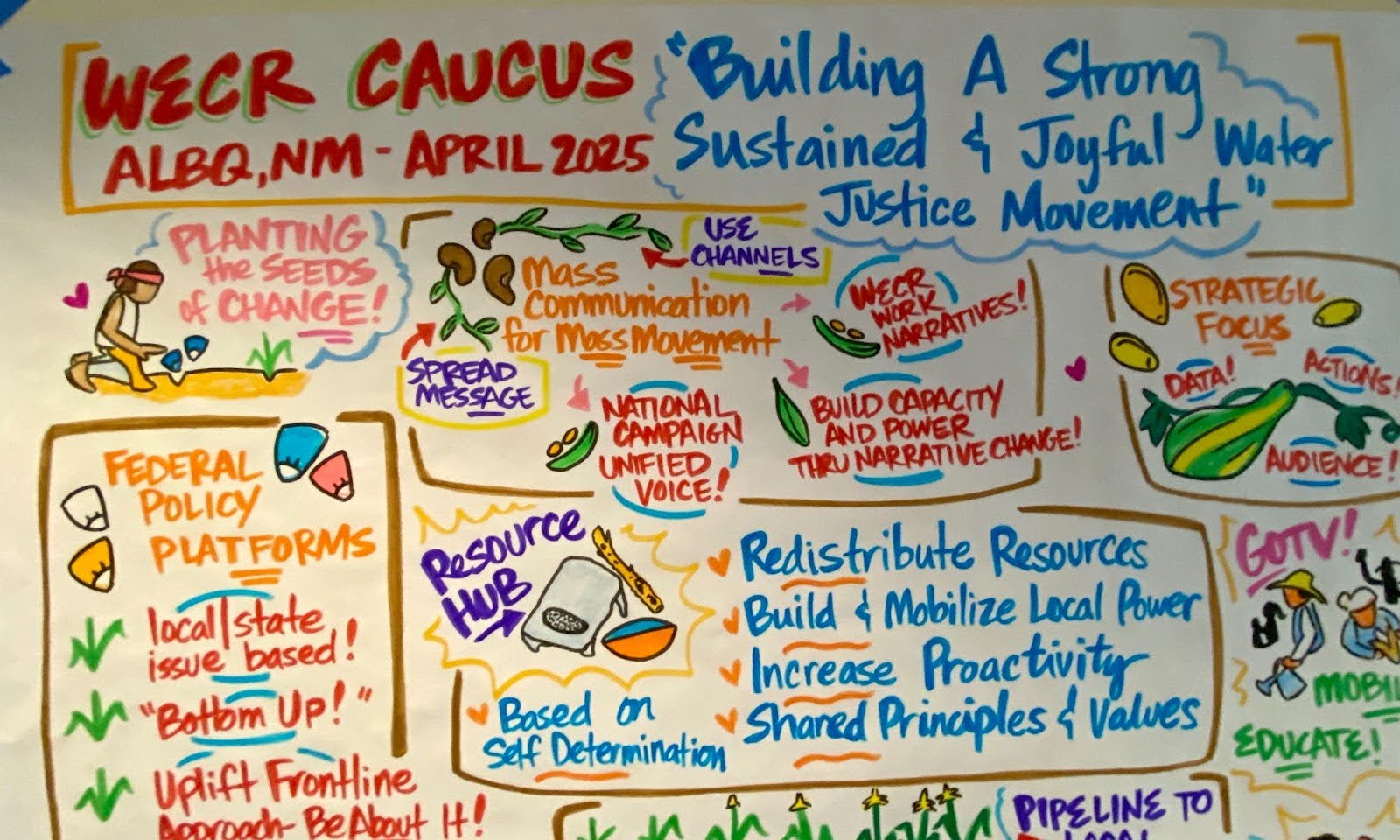2025 Convening: Building a strong, sustained, and joyful water justice movement
Albuquerque, New Mexico
About the Convening
PolicyLink organized the third annual Water Equity and Climate Resilience (WECR) Caucus convening with local co-host New Mexico Social Justice & Equity Institute in April 2025. Nearly 60 WECR Caucus core members and allies gathered in Albuquerque, New Mexico. Caucus members traveled from different parts of the country to build alignment on and activate our shared vision for water, climate, and justice, through the launch of the Caucus’ three-year Strategic Plan.
Convening highlights included the first in-person gathering of the Western Regional Workgroup, a site visit to Zuni Pueblo, dinner at the Los Jardines Institute, and an early screening of the new Sacred Places Institute for Indigenous Peoples film, Our Water Ways.
Grounding in the Southwest
Each year, the Caucus hosts its convening in different parts of the country to learn about local water and climate challenges, community-led solutions and connect local water realities to its national strategy. This year, PolicyLink collaborated with the Indigenous-led organization New Mexico Social Justice & Equity Institute to convene in Albuquerque to learn about several community-led efforts to address ongoing water challenges faced by Indigenous communities in New Mexico related to decades of uranium mining; inadequate water and sanitation infrastructure; and climate change.
Zuni Pueblo Community Visit
Zuni Pueblo, the largest of 19 Pueblo tribes in New Mexico, faces threats to their water supply and drinking water due to inadequate water infrastructure, climate-induced drought, and groundwater contamination from naturally occurring arsenic. The Caucus was invited to visit three important community spaces - A:shiwi A:wan Museum and Heritage Center, the Zuni Public Library, and Major Market. Established in 1992 by a small group of Zuni tribal members, the A:shiwi A:wan Museum and Heritage Center provides programs and exhibits to share learning about the A:shiwi ways of knowing and to honor Zunic culture. Established in 1974, the Zuni Public Library is one of 19 tribal libraries in New Mexico.
Major Market, a Zuni family owned business, is more than a grocery store in the Pueblo; it is an example of a community-led approach to address multiple community challenges. The owners have been intentional about sourcing and offering fresh foods to address the dearth of grocery stores in the Pueblo, supplying local Zuni schools with fresh foods, and developing the store into a solar-powered community hub that provides safe drinking water to residents through a reverse osmosis water purification system.
Navajo Water Panel, organized by DigDeep
At 27,000 square miles, the Navajo Nation is the largest Indian reservation in the US and extends into Arizona, New Mexico, and Utah. 30% of families on the reservation live without running water, forcing people to drive many miles to haul water to meet their basic needs. The Navajo Water Project (NWP), DigDeep’s oldest and largest water project, is a “community-managed utility alternative that brings water to homes without access to water or sewer lines.” The panelists highlighted the specific challenges the Navajo Nation faces in securing water infrastructure and how NWP is working to bridge the gaps through community-driven solutions. Throughout this conversation, the panel offered an overview of the provision of alternative water distribution systems to meet immediate needs, while also lifting up the need for policy change and funding investments to ensure sustainable long term solutions.
Activating our Strategy
During the 2024 in-person convening, participants strategized around the interventions the Caucus can take to address the “hot roots,” or underlying systemic challenges, that contribute to economic and racial disparities in water and climate outcomes in the United States. The hot roots identified by the WECR Caucus include (i) a value system in the U.S. that prioritizes profits over people; (ii) commodification of water that supersedes the human right to water and the rights of nature; (iii) policymaking that often excludes low income communities and communities of color; and (iv) a lack of sufficient funding, political power, and accountability mechanisms for frontline communities.

Graphic note taking illustrates the strategic discussion throughout the convening.
Building on this work, the Caucus launched a three-year Strategic Plan to advance water and climate justice through four main strategies:
-
Federal Policy: The Caucus models and advocates for federal policy priorities and solutions reflective of the lived experiences of frontline communities, communities of color, and low-income communities across the United States.
-
Narrative Change: The Caucus advances community-driven narratives and culture change that decomodify water, move away from extractive narratives, and build water stewardship.
-
Leadership Capacity: The Caucus models leadership on water and climate solutions that center those most impacted in governance and decision-making structures and invests in strengthening the capacity of frontline organizations.
-
Movement Building: The Caucus expands its collective power by increasing membership, deepening coordinated regional leadership on water and climate, and building a network of leaders and strategies to create an inclusive, comprehensive, and civically engaged water and climate justice movement.
The main focus of the convening was to introduce the 2025-2027 Strategic Plan and provide space for Caucus workgroups to identify the goals and activities that will activate the Strategic Plan over the next three years. These discussions identified the “seeds of change” needed to collectively plan and nourish our movement both in the immediate, but also to build long-term power.
Thank you New Mexico Social Justice Equity Institute, Zuni Public Library, the A:shiwi A:wan Museum and Heritage Center, Sherry Bellson, Major Market, Dig Deep, and Los Jardines Institute for your hospitality and partnership.
